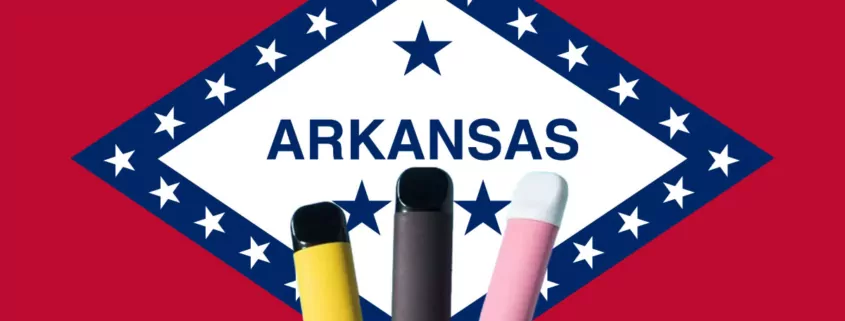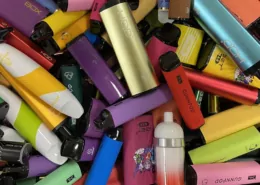Arkansas Vape Registry Law Bans Personal Possession (Act 590)
Arkansas has enacted a sweeping new law regulating vaping products, becoming the 12th U.S. state to adopt a PMTA registry model. However, Act 590 (formerly Senate Bill 252), signed into law by Governor Sarah Huckabee Sanders on April 14, 2025, includes a highly controversial provision rarely seen in Western democracies: a ban on the personal possession of vaping products deemed non-compliant by the state.
Like similar legislation emerging across the country, the Arkansas law’s framework reportedly originated from proposals drafted and promoted by tobacco industry lobbyists representing major companies like Altria or R.J. Reynolds. While vape industry advocates managed to secure some exemptions during the legislative process, the final Act imposes significant restrictions on the types of products legally available in the state.
How the Arkansas Vape Directory Works
Act 590 establishes a state-managed list, termed a directory, of vaping products permitted for legal sale. To be included, manufacturers must submit an application for each product (or product line), pay associated fees, and certify under penalty of perjury that their products meet stringent criteria:
- The product must have been commercially marketed in the U.S. on or before August 8, 2016.
- The manufacturer must have submitted a Premarket Tobacco Product Application (PMTA) to the U.S. Food and Drug Administration (FDA) for the product by September 8, 2020.
- The product must either have received marketing authorization from the FDA, still be under active review by the FDA, or have received a Marketing Denial Order (MDO) that is currently stayed by the FDA or a federal court.
These specific date cutoffs effectively mean that virtually all modern disposable vapes – products immensely popular with consumers but often criticized by public health groups and targeted by regulators – are banned from the directory. It also excludes most products made with synthetic nicotine, as few manufacturers submitted PMTAs for them by the 2020 deadline.
Exemptions and Uncertainties
The law does contain some specific exemptions. Open-system vaping devices (traditional mods and similar hardware) that use replaceable batteries and are sold without e-liquid are exempt from the directory requirements. However, devices with built-in, non-replaceable batteries, such as many popular refillable pod systems, appear to fall under the PMTA requirements.
Significant uncertainty remains regarding bottled e-liquids. While one section of the law seems to exempt them from the PMTA criteria for directory listing, other language in the Act potentially contradicts this. Industry advocates in the state believe bottled liquids are exempt, but clarification will likely depend on guidance issued by the Director of Arkansas Tobacco Control (ATC), the agency responsible for enforcing the law.
The Controversial Ban on Personal Possession
Perhaps the most striking element of Act 590 is its prohibition on individuals possessing or importing vaping products that do not meet the state’s standards, provided the individual knows the products are non-compliant and thus illegal in Arkansas.
This type of personal possession ban for vaping products is almost unheard of in the United States and other liberal democracies. Louisiana is believed to be the only other U.S. state with a similar provision in its PMTA registry law. Critics often compare such bans to policies found in more authoritarian countries like North Korea, Qatar, or Singapore.
While the law establishes the possession ban, it doesn’t create a specific mechanism for local police to proactively enforce it against individuals. ATC investigators have the primary authority. However, the risk remains. An individual could potentially face fines and product seizure if, for example, ATC investigates illegal online sales leading back to a purchaser, or if local law enforcement oversteps their authority during an unrelated encounter.
Additional Restrictions: Packaging Rules
Act 590 also imposes packaging and labeling requirements aimed at reducing youth appeal. Labels and marketing materials are forbidden from using images or terms resembling candy, desserts, juices, or sodas. Depictions of characters appealing to minors – including cartoons, superheroes, anime figures, video game characters, or mythical creatures like unicorns – are also banned.
Enforcement Timeline and Penalties
Manufacturers must submit their products for directory inclusion by September 1, 2025. Sales of any products not listed on the final directory become illegal after that date. The ATC Director will publish the directory on or after November 1, 2025, with enforcement activities commencing thereafter.
Businesses (retailers, wholesalers, manufacturers) violating the Act face penalties including fines and product seizure. The ATC has the power to conduct inspections, investigations, and bring charges against violators.
National Context and Advocacy
Arkansas joins a growing wave of states enacting PMTA registry laws, often based on model legislation provided by tobacco companies. Approximately 20 such bills were introduced across the U.S. in 2025 alone. Mississippi enacted its law in March. Other states with effective registry laws include Alabama, Florida, Kentucky, Louisiana, Oklahoma, and Utah. Laws in North Carolina, Virginia, and Wisconsin are set to take effect later in 2025. Iowa’s law is currently paused due to a court challenge.
Consumer advocacy groups like the Consumer Advocates for Smoke-free Alternatives Association (CASAA) actively campaign against these bills, arguing they restrict access to harm reduction products for adults and entrench the market dominance of major tobacco companies. CASAA provides resources for consumers to contact their state legislators regarding active bills.
Conclusion: A Concerning Precedent?
Arkansas’s Act 590 solidifies the trend of PMTA registry laws restricting vape market access, largely benefiting established tobacco companies whose products meet the narrow criteria. However, the inclusion of a ban on personal possession marks a significant and potentially concerning escalation in state-level vaping regulation in the U.S., raising questions about personal liberty and the practicalities of enforcement. As more states consider similar legislation, the Arkansas law serves as a critical case study in the ongoing battle over vape regulation, harm reduction, and corporate influence.
- Texas Ban on Certain Vapes Takes Effect, Business Owners Brace for Impact - August 18, 2025
- Philippines DTI Orders Takedown of Illegal Vapes Online - August 18, 2025
- Portugal Joins EU Pushback Against New Vape & Tobacco Tax - August 18, 2025









